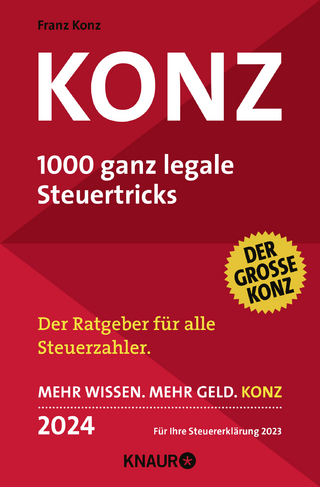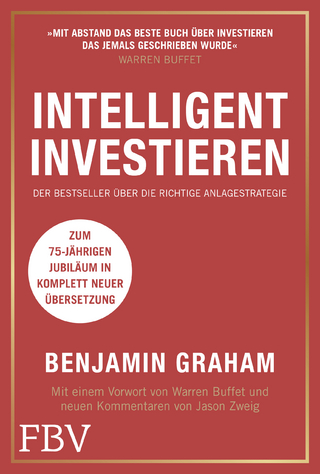
The Canadian Guide to Will and Estate Planning
McGraw Hill Higher Education (Verlag)
978-1-259-86341-7 (ISBN)
Praise for previous editions of The Canadian Guide to Will and Estate Planning:
“The authors have done a masterful job….This is a shelf reference every Canadian taxpayer and every Canadian family should have.” –THE GLOBE AND MAIL
“An informative, practical guide….The authors…cover all the bases.” –THE NATIONAL POST
Established as the go-to source of expert guidance, The Canadian Guide to Will and Estate Planning will save you money, taxes, risk, stress, and maintain peace of mind and family harmony. Completely updated to reflect the latest tax changes and with new information on charitable giving, including the donation of certain kinds of life insurance policies, this new edition explains practical strategies to:
• Avoid classic pitfalls, family feuds, and spousal disputes
• Minimize or avoid income, probate, and capital gains taxes
• Protect your digital assets
• Astutely deal with vacation properties, U.S. assets, and privately-owned businesses
DOUGLAS GRAY, LL.B., is a Vancouver-based expert on estate and retirement planning. Formerly a practicing business and real estate lawyer, he is now a consultant, speaker, columnist and author of 25 bestselling business and personal finance books (published primarily by McGraw-Hill and John Wiley & Sons), including the Top 10 National Best-seller, The Canadian Snowbird Guide. Many of these books have been published in other languages and adapted for foreign jurisdictions. Douglas has also designed a real estate investment software program for McGraw-Hill Ryerson and has been a regular expert contributor on personal finances issues for various internet sites and CD-ROM products, including Microsoft Money and QuickTaxHome and Business. He has also been a regular contributor to the Microsoft Canada Small Business web site and the Microsoft Network Canadian Money Central web site. Douglas has given seminars and presentations to over 250,000 people nationally and internationally in his various areas of expertise. Frequently interviewed by the media as an authority on personal finance and retirement matters, Douglas has appeared many times on various CBC, CTV and Global TV programs. He has given over 1,500 media interviews. He has been a regular columnist for Profit, Computer Paper, Canadian Computer Wholesaler, Canada News and Forever Young and a nationally syndicated columnist for Southam Press. He has also been a periodic contributor to the Globe and Mail, Toronto Star, House and Home, Macleans, Good Times, Canadian Moneysaver, Advisers Edge, The Successful Investor and many other publications.His family of web sites includes estateplanning.ca, retirementplanning.ca, snowbird.ca, homebuyer.ca and smallbiz.ca. DIANA GRAY is an experienced business owner and consultant. Her company provides centralized business services to small and medium-sized companies as well as home-based businesses. Diana lives in Vancouver, BC. John W. Budd is a professor in the Center for Human Resources and Labor Studies at the University of Minnesotas Carlson School of Management, where he holds the Industrial Relations Land Grant Chair. He is a Phi Beta Kappa graduate of Colgate University and received M.A. and Ph.D. degrees from Princeton University. Professor Budd has taught labor relations to undergraduates, professional masters students, and Ph.D. candidates and has received multiple departmental teaching awards as well as an excellence in education award from the Labor and Employment Relations Association (LERA). He has served on LERAs education committee and executive board and has published journal articles about teaching labor relations. Professor Budds main research interests are in industrial relations, especially labor relations. He is the author of The Thought of Work (Cornell University Press) Employment with a Human Face: Balancing Efficiency, Equity, and Voice (Cornell University Press), and Invisible Hands, Invisible Objectives: Bringing Workplace Law and Public Policy into Focus (with Stephen Befort, Stanford University Press) and the coeditor of The Ethics of Human Resources and Industrial Relations (with James Scoville, Labor and Employment Relations Association). He has also published numerous articles in Industrial and Labor Relations Review, Industrial Relations, the Journal of Labor Economics, the British Journal of Industrial Relations, the Journal of Industrial Relations, Labor Studies Journal, and other journals and edited volumes. He is a LERA Fellow and serves on the editorial boards of the British Journal of Industrial Relations, ILR Review, Human Resource Management Journal, and Labour and Industry. Professor Budd has been the director of the University of Minnesotas Center for Human Resources and Labor Studies and has also served as director of graduate studies for Minnesotas graduate program in human resources and industrial relations, one of the oldest and largest such graduate programs in the United States. He also has a monthly blog called Whither Work?
CHAPTER 1: What Is Estate Planning? Regardless of your age, the issue of estate planning, in conjunction with your will, is an essential element of life planning. However, at different stages of your life, certain issues may arise that require different estate planning strategies.
Stages of Estate Planning Over Your Lifetime • Top 10 Pitfalls to Avoid in Will and Estate Planning
CHAPTER 2: What Assets Will You Have? You could be quite surprised once you assess the current and projected value of your estate. After you read this chapter and complete the net worth statement in Appendix D, speak to your professional advisor and decide on the best approach to meet your wishes.
How Much Are You Worth? • Government Pension Plans • Pension Plans Funded by Your Employer • Your Own Tax-Sheltered Pension Plans • Using Your Home as an Additional Source of Income • Insurance for Your Present and Future Needs • Are Your Deposit Monies, RRSPs, RRIFs, Annuities and Insurance Funds Protected Against Default? • Keeping Track of Risk • Key Issues with Digital Assets and Estate Planning
CHAPTER 3: Building Your Estate Three Elements of Wealth Accumulation: Saving, Investing and Preserving Capital
CHAPTER 4: Understanding Wills It is estimated that only one out of three adults has a will, which means that two-thirds of Canadians die with their wishes unmet. A will is an important legal document that can ensure that your assets will be distributed to the beneficiaries of your choice in the way you wish.
What Happens If There Is No Will? • What’s in a Will? • Reflecting Your Wishes—Special Clauses in Your Will • Writing a Memorandum to Your Will •Keep Your Will Current • How to Change Your Will • Revoking Your Will • Is Your Will Valid in the U.S. for U.S. Assets? • Preparing a Will • Benefits of Using the Services of a Trust Company • The Complementary Document—Power of Attorney• Protecting Yourself in All Circumstances • Selecting an Executor • Selecting a Trustee • Selecting a Guardian for Your Children • Impact of Family Law Legislation • Fees and Expenses • How to Avoid Your Will Being Contested
CHAPTER 5: Understanding Powers of Attorney and Living Wills You will probably want to give authority to others to act on your behalf at some point in your life. Whether it is to help or take charge of financial situations or medical care, the power of attorney is the document that will allow you to choose your designate and set out the guidelines you wish to be followed.
Designating Power of Attorney • Living Wills
CHAPTER 6: Understanding Trusts Trusts are a very common way of dealing with a range of personal choice, family or business options and, as you will see, are not just for the rich with complex financial affairs.
Types of Trusts • The Creative Use of Living Trusts • Creating a Testamentary Trust • Selecting a Trustee • Benefits of Using the Services of a Trust Company • What Are the Fees and Expenses? • Outlining Everything in a Trust Agreement • The Tax Implications of a Trust
CHAPTER 7: Understanding the Probate Process While not all estates must go through the probate process, most estates do. Basically, the probate process ensures that your executor, or the administrator of your estate, is legally confirmed and that your will is approved by the courts.
What Is Probate? • Administration of the Estate • Responsibilities of the Executor/Administrator • Fees for Executors • Potential Liability of the Executor • Joint Ownership • Making the Most of It—Reducing Probate Fees
CHAPTER 8: Death and Taxes Don’t be fooled—just because there is no inheritance tax, as such, in Canada, the beneficiaries of your estate will incur a significant amount of tax in the settling of your estate unless you do an effective job in planning your estate for tax minimization.
The History of Estate Taxes in Canada • Capital Gains Taxation in Canada • Capital Gains Taxation on Death • Capital Gains Taxation on Gifts During Your Lifetime • Other Taxes That Could Be Payable by an Estate
CHAPTER 9: Dealing with the Tax Department and Estate Administration The final “moments of reckoning,” in terms of estate administration, are the filing of your final tax return. It is your executor’s responsibility to see that all of your debts are paid—even the ones to the Canada Revenue Agency.
Income Tax Returns for the Deceased • Special Tax Rules Applicable to Deceased Taxpayers • Tax Returns to Be Filed by the Executors for the Estate• Winding up the Estate
CHAPTER 10: Tax Planning Strategies Tax “planning” as opposed to tax “evasion” is perfectly legal. While this chapter won’t make you an expert, the odds are that at least one of the strategies outlined will help you minimize the future taxes payable in your estate.
Your Primary Tax Planning Goals • Your General Estate Planning Objectives • Transferring Property to Your Spouse • Utilizing the $800,000 Plus Capital Gains Exemption for Small Business Corporation Shares • Utilizing the Farm Property Rollover • Estate Freezing • Using Family Trusts for Income Splitting and Estate Planning
CHAPTER 11: Tax and Estate Planning If You Own U.S. Assets As if the tax laws of one country weren’t enough, you may be subject to the tax laws in both Canada and the United States if you live in the U.S. part-time or own property or other investments there.
Do U.S. Tax Laws Apply to You? • Residency and the Tax Treaty •Summary of Guidelines Regarding Filing a U.S. Income Tax Return • The IRS Wants Your Number • The IRS Has Your Number • Deadlines for Filing with the IRS •Rental Income from U.S. Real Estate • Selling Your U.S. Real Estate • U.S. Gift Tax • Possible Simultaneous U.S. and Canadian Taxes on Death • The Canada/U.S. Tax Treaty • Strategies for Reducing U.S. Estate Tax on Your U.S. Assets
CHAPTER 12: Vacation Properties Vacations are a time to relax and forget your worries. Financial concerns and capital gains taxes should be the last thing on your mind. This chapter will provide some ideas for dealing with vacation properties in your estate planning.
Keeping Things in Perspective • The Principal Residence Exemption• Will Planning and Your Vacation Property • Planning Strategies for Your Vacation Home • Should You Pay Tax Now or Later? • Buying Life Insurance to Cover Future Tax Liabilities • Using a Corporation to Own Your Vacation Property
CHAPTER 13: Privately-Owned Businesses With more than 100,000 family businesses in Canada, they have been the driving force building and sustaining our economy from Confederation to the present time. This chapter will help you create an effective succession arrangement and estate plan.
The Importance of Having a Plan • The Planning Process • Tax Planning in the Family Business • Shareholder Agreements • Creditor-Proofing Your Business
CHAPTER 14: Charitable Giving and Philanthropy Many of the greatest works of art are on display in public art galleries and museums for all to enjoy because of the philanthropy of past Canadians. Charitable donations can be made in many different ways—cash, works of art, marketable securities.
Choosing the best method will maximize your income tax saving. Tax Incentives for Charitable Gifts • Types of Donations • Private Foundations • Pitfalls to Avoid and Tips to Consider When Estate Planning
CHAPTER 15: Life, Health and Disability Insurance You must choose according to your needs from among the many types of life, health and disability insurance. The type of insurance you choose can play an important role in your estate planning strategy.
Identifying the Need for Life Insurance • Types of Life Insurance• Choosing an Insurance Agent • Choosing a Life Insurance Company • Comparison of Group Insurance Over Individual Insurance • Income Tax Treatment of Life Insurance • Health and Disability Insurance • Business-Related Insurance
CHAPTER 16: Selecting Professional Advisors Selecting the professional advisors that “fit” you is vital to protect your tax and estate planning interests. This chapter will outline the qualities and qualifications to look for in a lawyer, an accountant, a financial planner and other financial and investment advisors.
General Factors to Consider When Selecting an Advisor • Selecting a Lawyer • Selecting an Accountant • Selecting a Financial Planner • Other Financial and Investment Advisors
CHAPTER 17: Selecting Retirement Residences and Care Facilities Whether by choice or circumstance, you may need to enter a retirement residence or care facility in your later years. Use this chapter and the checklists to plan and choose wisely.
Where Do I Start? • What Is a Retirement Residence? • What Is a Care Facility? • Regulations, Licensing and Accreditation
CHAPTER 18: Planning Your Funeral In the midst of the grief and sorrow of losing a loved one, responsibilities have to be faced and decisions made consistent with the philosophical and spiritual beliefs of the deceased. Information in this chapter will help you make those decisions wisely and with confidence.
What Is a Funeral? • Arranging Your Funeral Services in Advance •Make Your Funeral or Memorial Service More Memorable • Expressions of Sympathy• When Death Requires an Autopsy • Documents and Permits • Support Services •Making the Arrangements Yourself • Selecting a Funeral Provider • Understanding Funeral Costs • The Funeral Service • Burial or Cremation? • The Availability of Financial Benefits and Assistance • Organ Donations and Medical Research
APPENDIX A: Sources of Information One of the challenges of research is to know where to start. This Appendix will save you a great deal of time, energy, money and hassle.
APPENDIX B: Samples Samples of documents discussed throughout the book will provide you with some more ideas, but these are for illustration only and must not be used as do-it-yourself
documents.
APPENDIX C: Charts The handy charts in this Appendix will provide some points of comparison on topics discussed throughout the book.
APPENDIX D: Checklists. These checklists will help you take stock of your current situation and focus on your future goals.
GLOSSARY The definitions here will ensure that you and your professional advisors are speaking the same language.
INDEX
ABOUT THE AUTHORS
READER INPUT AND EDUCATIONAL SEMINARS
| Erscheinungsdatum | 16.08.2017 |
|---|---|
| Verlagsort | London |
| Sprache | englisch |
| Maße | 191 x 234 mm |
| Gewicht | 766 g |
| Themenwelt | Sachbuch/Ratgeber ► Beruf / Finanzen / Recht / Wirtschaft ► Geld / Bank / Börse |
| Recht / Steuern ► EU / Internationales Recht | |
| Recht / Steuern ► Öffentliches Recht | |
| Wirtschaft ► Allgemeines / Lexika | |
| Wirtschaft ► Betriebswirtschaft / Management ► Allgemeines / Lexika | |
| Wirtschaft ► Volkswirtschaftslehre | |
| ISBN-10 | 1-259-86341-7 / 1259863417 |
| ISBN-13 | 978-1-259-86341-7 / 9781259863417 |
| Zustand | Neuware |
| Haben Sie eine Frage zum Produkt? |
aus dem Bereich


